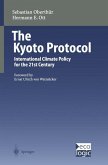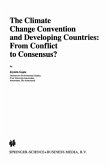This book shows how humankind can 'prevent dangerous interference with the c- mate system' without dangerous interference with the global economic system. In the two underlying studies on behalf of the Ministry of Environment and Transport of i the German federal state of Baden-Württemberg, the results have been elaborated through scientific evaluation of different climate protection systems and intensive developmental work on an efficient climate protection system. The results will be presented in nine chapters according to the following nine basic R&D steps: 1. Quantifying the 'ultimate climate objective' of the world community in order 'to prevent dangerous interference with the climate system,' thus achieving climate sustainability; 2. Development of a comprehensive standard system for evaluating the prospect of success for different climate protection systems; 3. Based on this scientific standard system, evaluation of the current Kyoto system and of the most important proposals for 'incremental regime evolution' of the Kyoto system. Unfortunately, it must be noted that these systems are incapable of achi- ing climate sustainability; 4. Evaluating three proposals for 'structural regime change' of the Kyoto system. Following this objective evaluation process and numeric comparison of the diff- ent proposals, 5. Description of the eight basic elements of GCCS and its in-depth 'critical asse- ment;' 6.
From the reviews:
"This book shows how much humankind can 'prevent dangerous interference with the climate system' without dangerous interference with the global economic system. ... this book is centered on the economic side of the prevention of global warming. ... It is certainly a rich source of information on the economic part of the Kyoto protocol ... . Recommended for critics of the Kyoto system and admirers of the global climate certificate system."
(Ch. Kessler, Meteorologische Zeitschrift, Vol. 15 (6), 2006)
"This book provides an interesting alternative approach to global climate change policy, and its reliance on market-based incentives is its strong suit. ... Those with a sincere interest in policy proposals based on per capita allocations and emissions trading would find this manuscript of more interest."
(Joseph E. Aldy, Bulletin of the American Meteorological Society, September, 2006)
"This book shows how much humankind can 'prevent dangerous interference with the climate system' without dangerous interference with the global economic system. ... this book is centered on the economic side of the prevention of global warming. ... It is certainly a rich source of information on the economic part of the Kyoto protocol ... . Recommended for critics of the Kyoto system and admirers of the global climate certificate system."
(Ch. Kessler, Meteorologische Zeitschrift, Vol. 15 (6), 2006)
"This book provides an interesting alternative approach to global climate change policy, and its reliance on market-based incentives is its strong suit. ... Those with a sincere interest in policy proposals based on per capita allocations and emissions trading would find this manuscript of more interest."
(Joseph E. Aldy, Bulletin of the American Meteorological Society, September, 2006)








